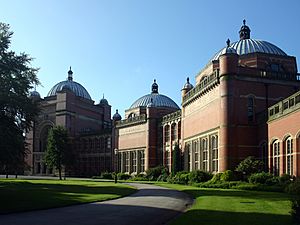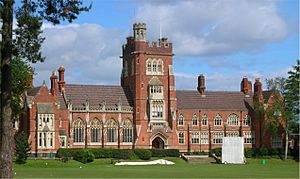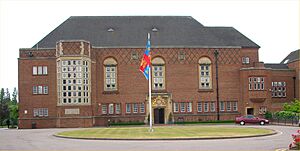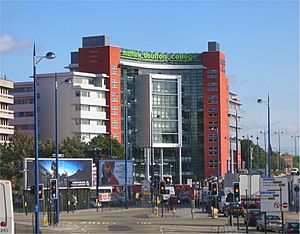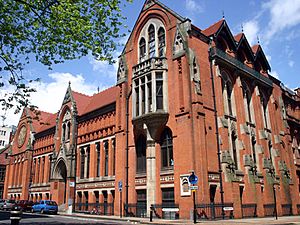Education in Birmingham facts for kids
This article tells you all about education in Birmingham, a big city in England. You'll learn about schools, colleges, and universities in Birmingham.
Contents
Schools for All Ages
In Birmingham, just like the rest of England, it's a rule that everyone goes to school between the ages of 5 and 16. Most kids go to schools funded by the government, called state schools.
State Schools: Learning for Everyone
State schools usually follow the National Curriculum. This is a set of subjects and topics that schools teach.
Most state schools are split into two main types:
- Primary schools are for younger children, usually from age 5 to 11 (Years Reception to 6).
- Secondary schools are for older students, from age 11 to 16 (Years 7 to 11).
After secondary school, many students stay on for two more years (Years 12 and 13) in a sixth form. This can be at their secondary school, a special sixth form college, or a further education college. These years help students prepare for university or jobs.
Some schools are called "all-through" schools, meaning they teach children from primary all the way to secondary age. There are also special schools for students with particular needs.
Many primary schools in Birmingham are run by the local council. However, a lot of secondary schools are now academies. Academies are state schools, but they are run by their own trusts instead of the local council. Some academies are part of bigger groups called multi-academy trusts.
Birmingham also has many voluntary aided schools. These are state schools that often have a religious background, like Roman Catholic, Church of England, Jewish, or Islamic schools. They get government funding but also have support from their religious group. There are also "free schools" which are new state schools set up by groups like parents or teachers.
Most state secondary schools in Birmingham are comprehensive schools. This means they welcome students of all abilities. However, Birmingham also has some grammar schools. These schools are special because students have to pass an entrance exam to get in. They are known for being very academic.
Private Schools: Another Option
A smaller number of children in Birmingham go to private schools. These schools charge fees for students to attend. Some private schools in Birmingham are very old and well-known across the country, like King Edward's School.
Further Education: Beyond School
After leaving secondary school, many young people in Birmingham go to further education colleges. These colleges offer a wide range of courses, often focusing on practical skills for jobs. Some popular colleges include City College, Cadbury College, and Birmingham Metropolitan College.
These colleges teach many different subjects. Some even offer courses that are similar to university-level studies. For example, University College Birmingham specialises in courses that help students get ready for specific jobs.
Birmingham also has many courses for adults who want to learn new skills or hobbies. The city council's Birmingham Adult Educational Service (BAES) offers thousands of courses each year. You can learn foreign languages, computer skills, maths, or different types of art. Some courses can even help you get qualifications like GCSEs and A-levels. BAES also helps people who have moved to Birmingham learn English.
You can also find creative workshops at places like the mac (Birmingham) arts centre. Musicians from places like Punch Records offer workshops to teach modern music skills, like DJ mixing.
Higher Education: University Life
Birmingham is a big city for higher education, which means university-level studies. It has seven universities!
Here are the universities in Birmingham:
- University of Birmingham (became a university in 1900)
- Aston University (became a university in 1966)
- Birmingham City University (became a university in 1992)
- Birmingham Newman University (became a university in 2012)
- University College Birmingham (became a university in 2012)
- The University of Law (a private university, 2012)
- Arden University (a private university, 2015)
Learning the Arts
Birmingham City University (BCU) is especially important for arts education.
The Royal Birmingham Conservatoire is part of BCU. It's a special school for music and drama, one of only a few in the UK. It has strong connections with the City of Birmingham Symphony Orchestra. The Conservatoire moved into a new, modern building in the city centre.
The Birmingham Institute of Art and Design (BIAD) is another part of BCU. It's one of the biggest places in the UK to study art, design, and media. BIAD includes the Birmingham School of Art and the School of Jewellery. The School of Jewellery is in the Jewellery Quarter of the city, which shows how important jewellery making is in Birmingham.
The Royal Birmingham Conservatoire's School of Acting teaches drama. It's a leading school for acting and offers courses for both young people and adults.
Elmhurst Ballet School is the oldest professional dance school in the UK. It teaches dance and academic subjects to students of secondary school age. The school moved to Birmingham in 2004 and works closely with the Birmingham Royal Ballet.
Libraries: A World of Books
The city council also runs many libraries across Birmingham. There are 41 local libraries, plus the amazing Library of Birmingham. This library is thought to be one of the biggest public libraries in Europe!
Birmingham's libraries have over 2.7 million books and welcome more than 4 million visitors every year. They are great places to read, study, and learn.
 | Mary Eliza Mahoney |
 | Susie King Taylor |
 | Ida Gray |
 | Eliza Ann Grier |


